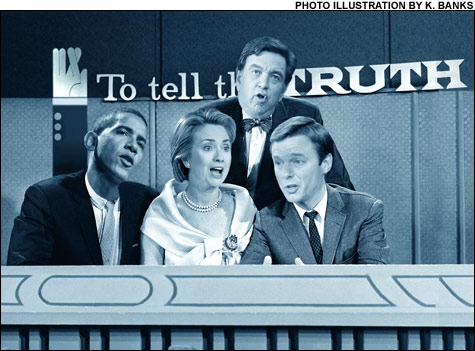
TOUGH CHOICE: Which of these candidates will woo the viewers with their responses?
|
Thursday April 26 marks the first mega-event of the campaign season: the Democrats’ initial debate, to be held in South Carolina. Usually the media incorrectly analyzes these events, particularly if they are held early in the election cycle. To understand what the debate means and how to parse the proceedings, readers should bear in mind the following:
1) A mass debate diminishes everyone.
In a debate that includes seven or eight candidates, it is virtually impossible for anyone to stand out. No one gets enough time to speak, and the home viewers — to the extent there are any — tend to come away with an impression of the general field, rather than a sense of any particular candidate. Moreover, fringe candidates who have no chance of winning — think Dennis Kucinich or Mike Gravel — and therefore have nothing to lose, end up saying outrageous things that viewers will remember, thus obscuring the front-runners.
2) The key is to say things that will be highlighted on the local and national news.
Most viewers will see only snippets of the debate replayed on the news or discussed on talk shows. This puts the candidates under pressure to deliver a memorable sound-bite or to get involved in a much discussed confrontation — one that will likely include Hillary Clinton, because she is both the putative front-runner and has taken hawkish positions on the Iraq War that make her an easy target.
3) The goal for each candidate will be to do “better than expected” so the media will praise you.
Post-debate media analysis will determine the winners and losers. That means candidates for whom the bar is lower because expectations are lower — say Joe Biden or Bill Richardson — will come in with a slight advantage over Hillary Clinton or Barack Obama.
4) The debate means much more to second- and third-tier candidates.
The three front-runners are established. That means their primary goal in this outing will be to avoid losing ground or making a mistake. For the other five candidates, it’s different: these debates offer their only real chance to break out in front of a media audience. They will have to find a way to perform far better than their opponents (which is hard when you have only about 10 minutes to speak) or to appear strikingly and refreshingly different.
With these considerations in mind, here are the prospects for each of the candidates’ debate performances, in reverse order of their chances for nomination:
Mike Gravel: His goal will be to make the “highlight reel” by saying something extreme or picking a fight with Hillary. Chances are the media will ignore him.
Dennis Kucinich: He, too, will be aiming for the “highlight reel” and will try to rouse the few super-liberals he has left. He, too, will probably be ignored in post-debate coverage.
Joe Biden: This is Biden’s opportunity to shine. He speaks well, and, if he can keep his remarks brief (admittedly a big “if”), he has a chance to impress. Look for him to come out of the debate as one of the media’s favorite. It still won’t be enough to lift him out of the second tier, but he has to start somewhere.
Chris Dodd: Dodd is in the same position as Biden but is slightly worse off, since Biden tends to be a better orator. His goal is to do something roundly memorable. That’s a lot easier said than done.
Bill Richardson: Richardson probably has more riding on this one debate than any other candidate. He is at the top of the second tier and has been praised for his stump performances. He has to come away with a performance that blows away the press. Again, that’s easier said than done. His best bet is to stress what makes him different from the other candidates — his position as a statehouse leader; his foreign-policy experience, and, of course, his Hispanic roots.
John Edwards: Edwards is in the best position to put in a better-than-expected performance. He’s run before and is good on the stump so one would expect him to do well. But because Obama and Hillary have gotten so much of the early publicity, the general public and the press have forgotten how good Edwards can be. Thus he has a decent chance to emerge from the debate with momentum. It would be hardly surprising if he were the candidate who went after both Obama and Hillary in a friendly way and created the most memorable highlight of the encounter.
Hillary Clinton: This is an important appearance for Clinton. Her supporters have been maintaining all along that viewers have a false impression of her, one based on her tenure as first lady rather than on her time in the Senate. This is her chance to impress. The more she can appear warm and composed, the better off she will be — especially since she is bound to be attacked by the other candidates. (Women who are attacked in debates usually have a slight advantage because viewers empathize with them.) If Hillary can good-humoredly sidestep the parries, she will win points. Still, expectations for her are high, so it will be hard for her to exceed them. Her main goal is to come out of the debate without losing ground.